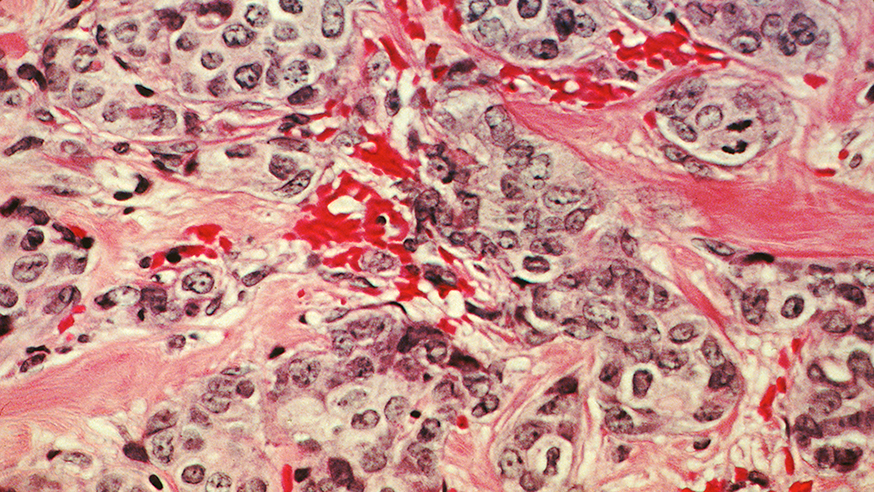
CLOSED: Towards non-invasive monitoring and prediction of cancer evolutionary dynamics from cfDNA
Application closing date: 16/11/25
Project background
Cancer development is fundamentally an evolutionary process, however monitoring evolutionary dynamics through treatment remains challenging. Our team have recently developed a new methodology that can monitor clonal evolution by measuring DNA methylation, a stably inherited epigenetic marker on tumour DNA (Gabbutt et al, 2022). The method analyses fluctuating CpG (fCpG) loci which oscillate between homozygous methylated, heterozygous, and homozygous demethylated states within individual cells. In a mixed population of cells we can detect clonal expansions by looking at the relative signal between these three states. We have recently applied this methodology to blood cancers, showing that we can infer clinically-relevant parameters such as tumour age and growth rate (Gabbutt et al, 2025). However the limited accessibility and sampling of solid tumours has so far limited its application in other cancer types.
Dying tumour cells shed fragments of their DNA into the bloodstream, and these can be detected as cell-free DNA (cfDNA) in plasma from cancer patients. Detection of specific tumour mutations (or indeed epimutations) in cfDNA is already used to monitor resistance and guide therapy (for example Sartore-Bianchi et al, 2022), however the (epi)genetic mutations that lead to cancer are diverse and most tumours share very few mutations, if any. Therefore we propose to instead use methylation profiles; these are maintained in cfDNA, and we hypothesise that they can be used to monitor tumour evolution non-invasively through liquid biopsies.
Major technical challenges to solve include dealing with low purity of tumour-derived cfDNA and the heterogeneous methylation patterns between different cell types.
This project is part of the EU-funded Evolutionary Medical Genomics Doctoral Network (EvoMG-DN), which is currently recruiting a cohort of 15 PhD students based at leading universities, research institutes, and industry partners across 7 European countries. The programme offers the students multiple travel opportunities, summer schools, and placements in other participating labs across Europe.
Eligibility: Only applicants who satisfy the following mobility rule are eligible to apply: Applicants must not have resided or carried out their main activity (work, studies, etc.) in the UK for more than 12 months in the 36 months immediately before their recruitment date.
The candidate will receive a monthly salary of Euros 4,917 (subject to tax and National Insurance deductions), which includes both a living allowance and a mobility allowance, for a duration of 36 months. Additionally, candidates with a family may be eligible for a monthly family allowance of Euros 380 (also subject to tax and National Insurance deductions), provided they meet the eligibility criteria for the MSCA family allowance. In the fourth year of the PhD, the candidate will receive the standard ICR stipend rate.
Project aims
- Develop a sequencing approach to detect mutations and methylation in cfDNA from cancer patients
- Build computational tools to interpret methylation profiles from cfDNA
- Use sequencing to reconstruct clonal dynamics through treatment and resistance
- Apply the new methodology to samples from large clinical cohorts
Further details & requirements
Hypothesis: Methylation profiling in cfDNA can be used to infer tumour clonal dynamics, for example in treatment response, resistance and recurrence.
The student will work closely with our our industrial partner Nonacus, to design the a panel for bisulphite sequencing of the selected methylation loci in cfDNA. Nonacus are experts in genomics technology for next-generation sequencing of liquid biopsies and will provide expertise in the panel design, manufacture and wet-lab protocol.
We will then apply the bespoke panel to the sequencing of cfDNA. We have an existing biobank of cfDNA from CRC patients, as well as cfDNA from people who don’t have CRC. The student will need to develop a new computational pipeline for extracting the CRC-specific signal from a potentially low-purity cfDNA sample.
The student will then validate their pipeline by applying it to longitudinal cfDNA samples that we have biobanked in-house. Because the method doesn’t analyse a patient-specific set of mutations, it should be widely applicable to any CRC cohort. Finally the student will apply it to large clinical cohorts that are readily accessible through our long-standing collaborations with clinicians at the Royal Marsden Hospital.
The studentship will be based in the Genomics and Evolutionary Dynamics group, within the Centre for Evolution and Cancer. We are a highly diverse and interdisciplinary team of about 15 people, consisting of clinicians, biologists, mathematicians and computational scientists. Our lab has around 12 years of experience in the development of novel sequencing approaches and bioinformatic analyses for cancer evolution, and full training will be provided to the successful candidate.
As part of their training the candidate will have the opportunity to visit two other institutions within the Doctoral Network. Firstly they will undertake a two-month placement at Chalmers University (Sweden, with Dr Eszter Lakatos), where they will be provided with training in mathematical modelling to facilitate the integration of cfDNA assays with models of clonal evolution in patients. Secondly the candidate will have a short two-week secondment at Barcelona Supercomputing Center (Spain, with Dr Toni Gabaldón), which will strengthen their ability to scale computational approaches to large datasets.
BSc (First or 2:1) or Master’s degree in a biological, computational or quantitative subject.
A strong interest in evolutionary approaches to medicine is essential, and willingness to engage in extensive mathematical and computational work. Experience in sequencing technologies, epigenetics, or computational modelling would be highly advantageous but is not essential. Motivation to work at the interface of academia and industry, and enthusiasm for translational applications of genomics, will be highly valued.
- “Fluctuating methylation clocks for cell lineage tracing at high temporal resolution in human tissues” Gabbutt et al, Nat Biotechnol. 2022 May;40(5):720-730. doi: 10.1038/s41587-021-01109-w.
- “Fluctuating DNA methylation tracks cancer evolution at clinical scale” Gabbutt et al, Nature. 2025 Sep;645(8081):764-773. doi: 10.1038/s41586-025-09374-4
- “Circulating tumor DNA to guide rechallenge with panitumumab in metastatic colorectal cancer: the phase 2 CHRONOS trial” Sartore-Bianchi et al, Nat Med. 2022 Aug;28(8):1612-1618. doi: 10.1038/s41591-022-01886-0.